Where to Sell Your Game Codes as an Indie Game Developer
Looking to sell your indie game? Here's a quick guide to the top platforms:
| Platform | Revenue Share | User Base | Key Features |
|---|---|---|---|
| Steam | 70% developer / 30% platform | 100M+ | Large audience, community features |
| Epic Games Store | 88% developer / 12% platform | 230M+ | Higher revenue share, free games |
| GOG | 60% developer / 40% platform | Smaller | DRM-free, curated selection |
| Itch.io | Developer chooses (0-100%) | Niche | Full pricing control, indie focus |
| Humble Bundle | 50% developer / 50% platform | Moderate | Charity support, bundles |
| GameJolt | Up to 100% developer | 330M+ visits/year | Early access, devlog tools |
| Own Website | 100% developer | Varies | Full control, more work required |
Key considerations:
- Audience size and reach
- Revenue share and pricing control
- Marketing and discoverability support
- Platform features and community tools
Choose based on your game type, target audience, and how much control you want over sales and marketing.
Related video from YouTube
1. Steam
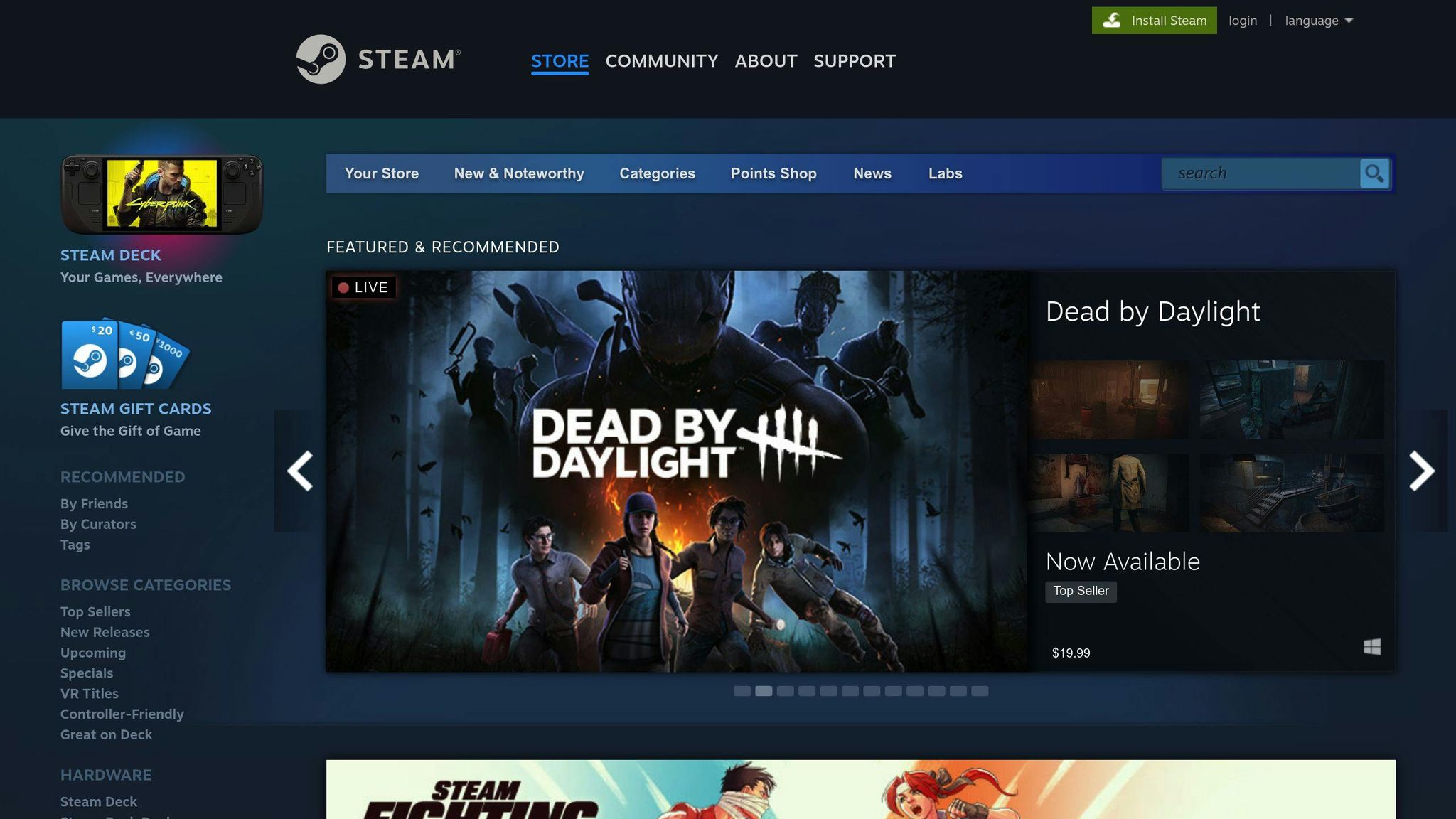
Steam is a big PC game store with over 100 million users. It's a key platform for PC gamers. To sell your game on Steam:
- Join Steamworks Distribution program
- Pay $100 per game submission
- Get your $100 back after earning $1000
Revenue Share
| Item | Steam's Cut | Developer's Cut |
|---|---|---|
| Game sales | 30% | 70% |
| In-game purchases | 30% | 70% |
| Subscriptions | 30% | 70% |
Audience and Games
- Large user base
- Many types of games (indie to big-budget)
- Fair prices
- Good for buyers with game recommendations
Finding Your Game
Steam helps players find new games through:
- Store front page
- Game recommendations
- Search tools
Help for Developers
Steam offers tools to help sell your game:
- Promotion features
- Sales data
- User stats
These tools can boost your game's visibility and sales, which may offset the 30% cut Steam takes.
2. Epic Games Store
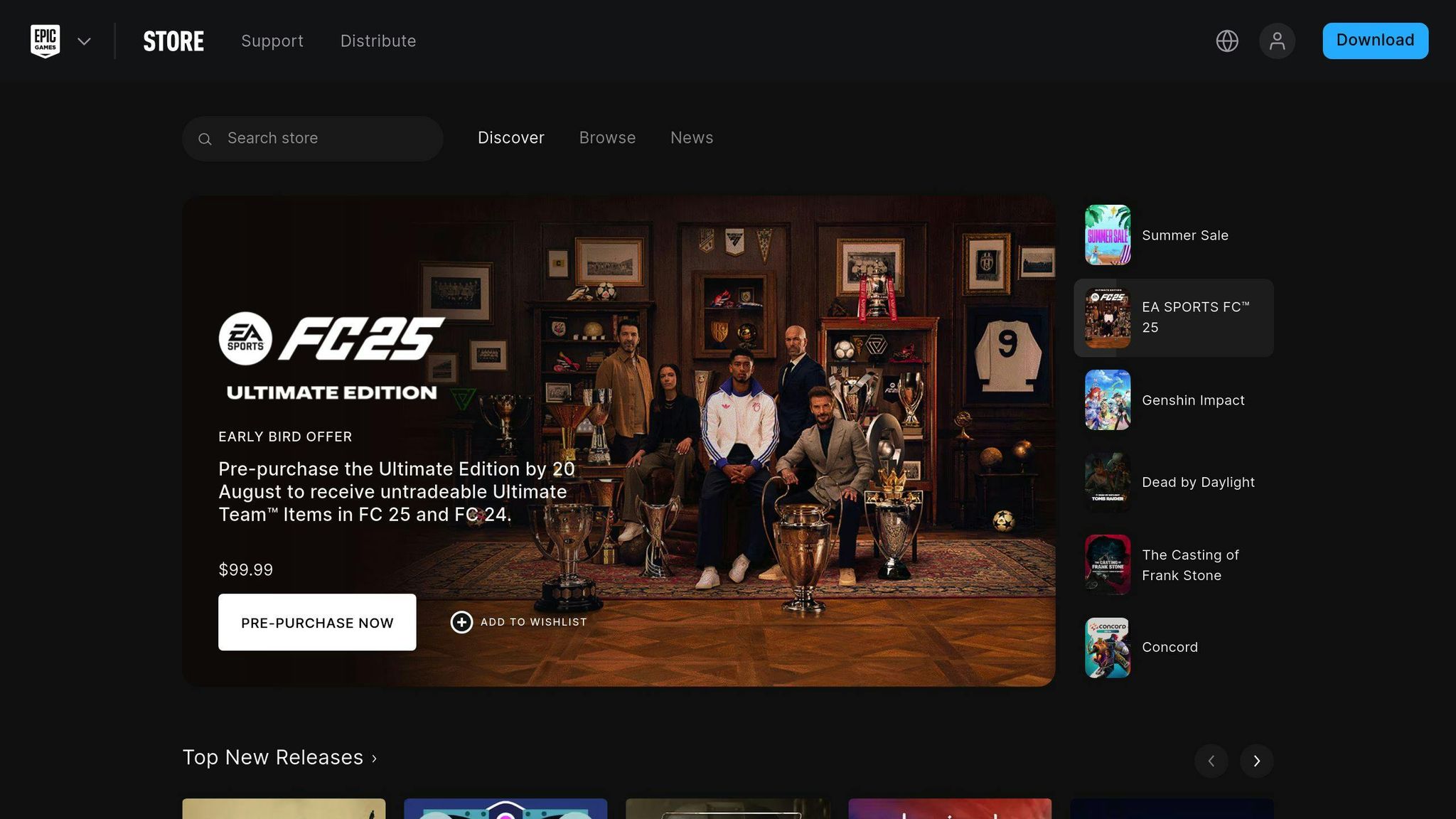
The Epic Games Store is another option for indie game developers to sell their games. Here's what you need to know:
Revenue Share
| Party | Share of Revenue |
|---|---|
| Developer | 88% |
| Epic Games Store | 12% |
Developers can use other payment methods to keep all proceeds, except for in-game purchases.
Users and Reach
The store has over 230 million users, giving your game a large potential audience.
Getting Your Game on the Store
You can self-publish your game on the Epic Games Store. This makes it easier to reach potential players.
Free Games and Visibility
Epic often gives away free games. This can bring more users to the store and potentially to your game.
Help for Developers
Epic offers several benefits:
| Benefit | Description |
|---|---|
| Large Audience | Access to over 230 million users |
| Higher Revenue Share | Keep 88% of your game's earnings |
| Language Support | Help with translating your game's store page |
| Funding | Possible money for exclusive deals |
The Epic Games Store is a good choice for indie developers who want to keep more of their earnings and reach many players. However, keep in mind that the store is still growing and may not have all the features of other platforms yet.
3. GOG (Good Old Games)
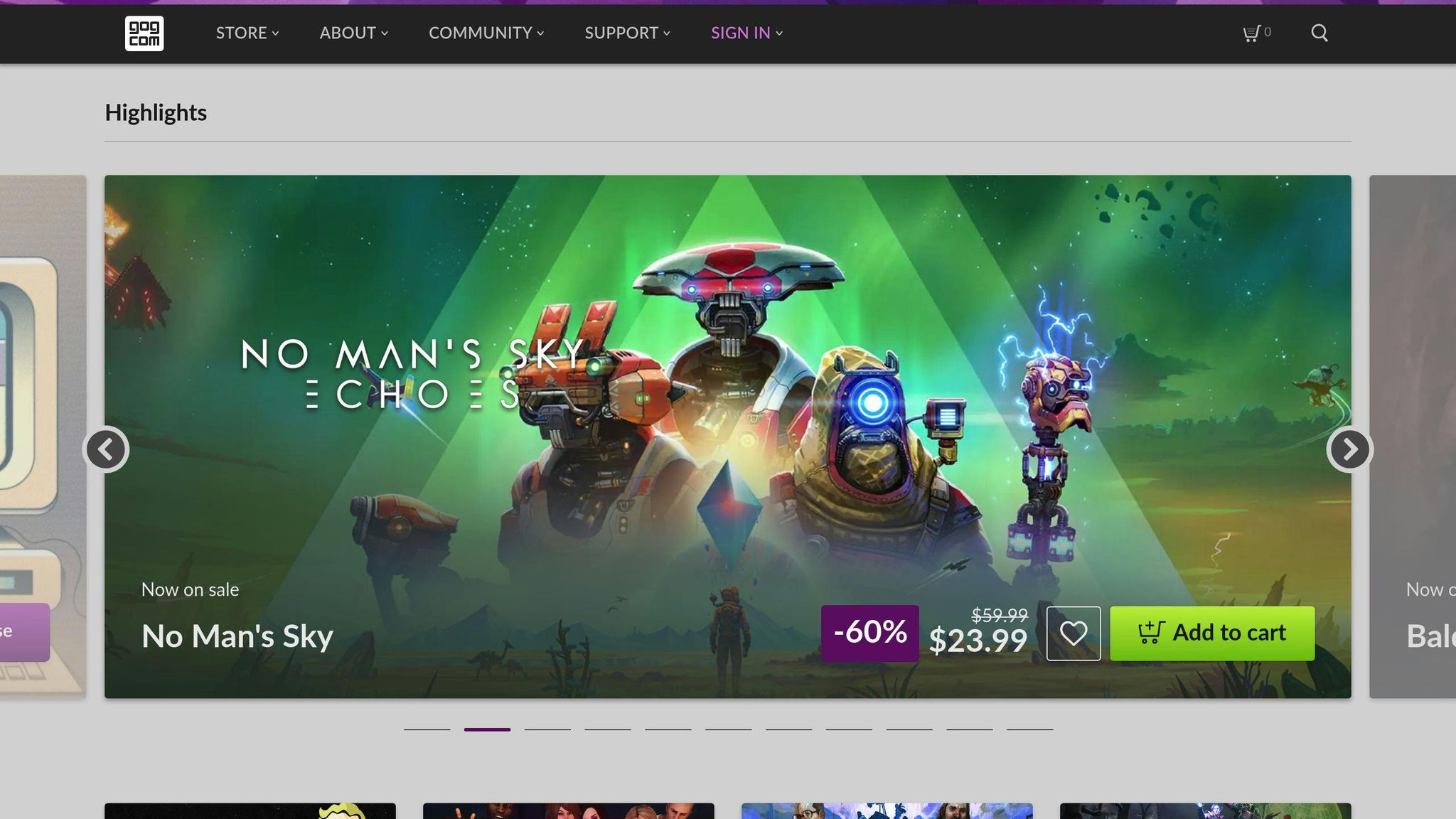
GOG is a digital game store that sells games without DRM (Digital Rights Management). This means you can play your games without needing to be online or use special software.
How GOG Works for Developers
| Aspect | Details |
|---|---|
| Revenue Split | Developers get 60%, GOG gets 40% |
| Advance Payment | Possible to get money upfront |
| Game Library | About 5,000 games (smaller than some other stores) |
| Game Selection | GOG picks which games to sell |
Why Sell on GOG?
| Pros | Cons |
|---|---|
| No DRM appeals to some gamers | Smaller user base than other platforms |
| Curated game selection can help your game stand out | Less marketing support compared to bigger stores |
| Some marketing help (store features, social media) | Revenue split not as good as some other platforms |
Is GOG Right for You?
GOG can be a good choice if:
- You want to sell your game without DRM
- You're okay with a smaller audience
- You don't need extensive marketing help
However, if you need a larger audience or more marketing support, you might want to look at other platforms too.
4. Itch.io
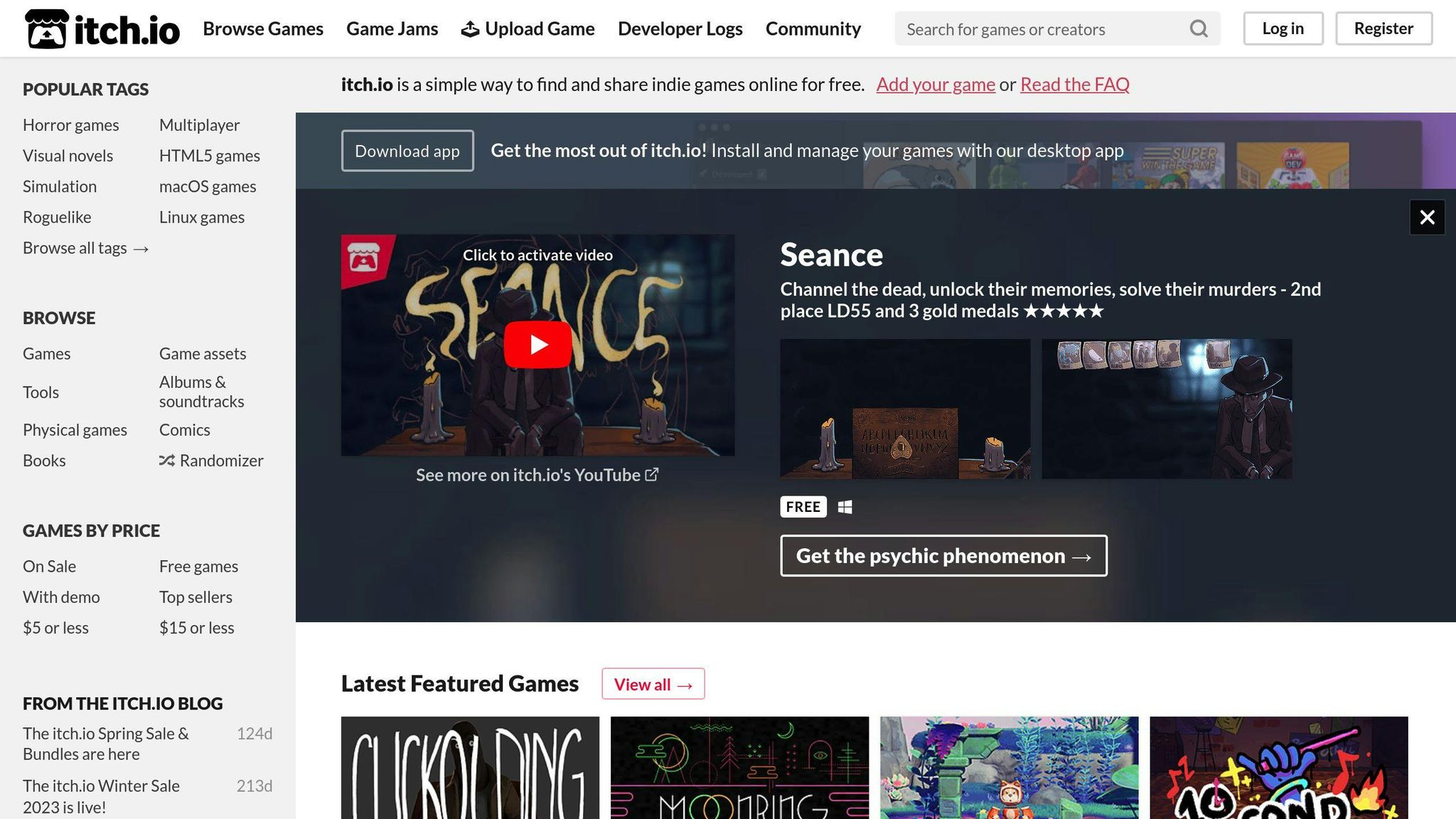
Itch.io is an online marketplace where game creators can sell their games. It's known for its focus on indie games and gives developers control over pricing and revenue.
How It Works
| Feature | Description |
|---|---|
| Revenue Share | Developers choose how much to share with Itch.io (0-100%) |
| Pricing | Set any price, including free or pay-what-you-want |
| Game Types | Mainly indie and niche games |
Pros and Cons
| Pros | Cons |
|---|---|
| Full control over pricing | Smaller user base than other platforms |
| Low or no platform fees | Limited game discovery features |
| Good for niche games | Less marketing support |
User Base and Discovery
Itch.io has fewer users than big platforms like Steam. This means:
- Harder for games to get noticed
- Developers need to do more of their own marketing
- Good fit for games with specific, niche audiences
Marketing Help
Itch.io offers some help to promote games:
- Featured spots on the homepage
- Posts on Itch.io's social media
- But less support than larger platforms
Itch.io works well for indie developers who want control over their game's pricing and are ready to handle most of their own marketing.
sbb-itb-be22d9e
5. Humble Bundle
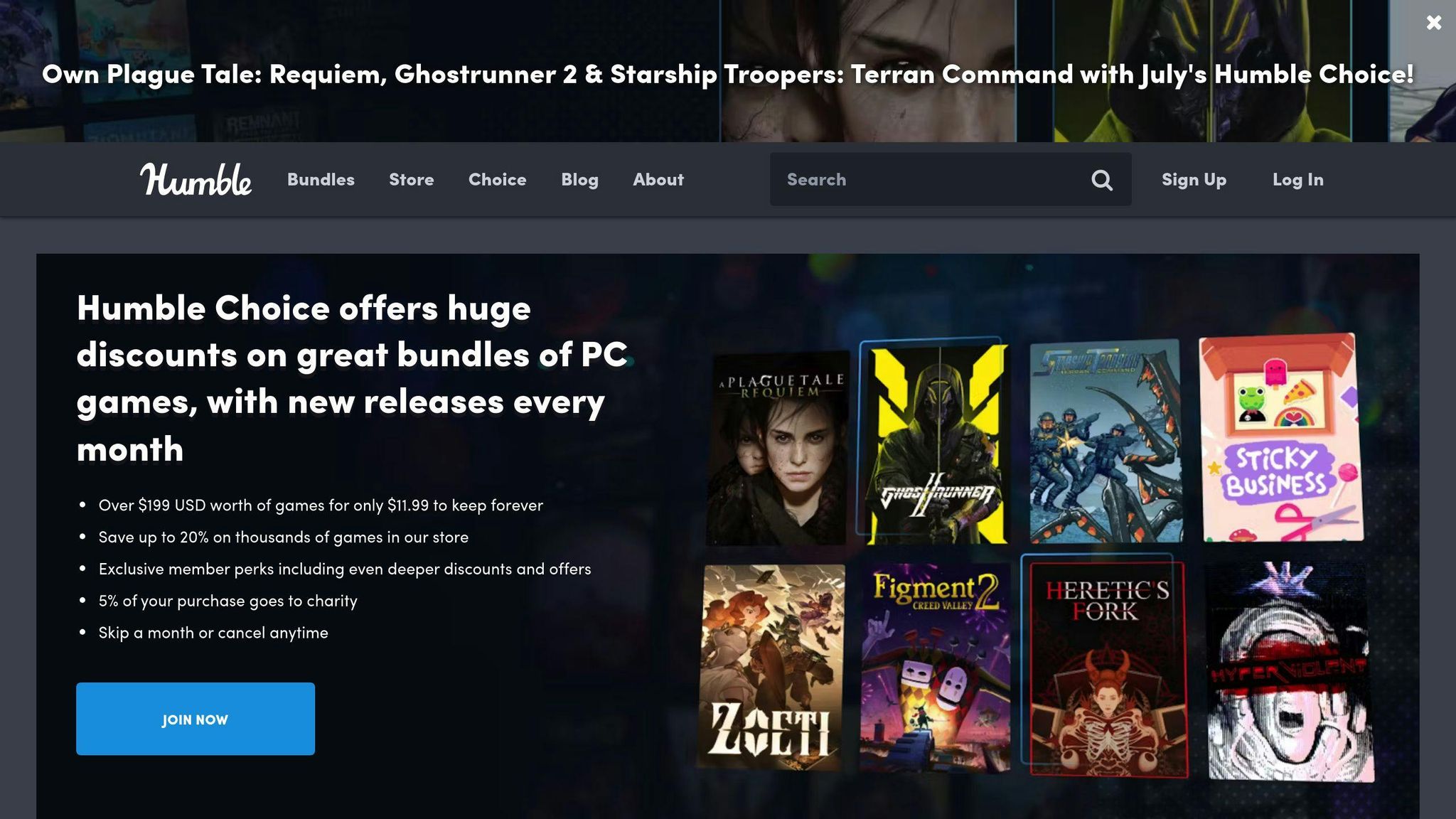
Humble Bundle is a platform where indie game developers can sell their games. Here's what you need to know:
Revenue Split
| Party | Share of Revenue |
|---|---|
| Developer | 50% |
| Humble Bundle | 50% |
This split is better for developers than some other platforms offer.
Users and Reach
Humble Bundle has fewer users than big platforms like Steam, but its users like indie games and support good causes.
Getting Your Game on the Store
Humble Bundle picks which games to sell. If they choose your game, it can help more people find it.
Selling on Your Own Website
Humble Bundle gives you a tool called "Humble Widget" to sell your game on your own website.
Help for Developers
| Type of Help | What Humble Bundle Offers |
|---|---|
| Marketing | Shows games on their store and social media |
| Discoverability | Picks games to show on their front page |
Humble Bundle is good for indie developers who want:
- To keep more money from their sales
- To support good causes
- A platform that focuses on indie games
But remember, you'll still need to do most of your own marketing to sell your game.
6. GameJolt
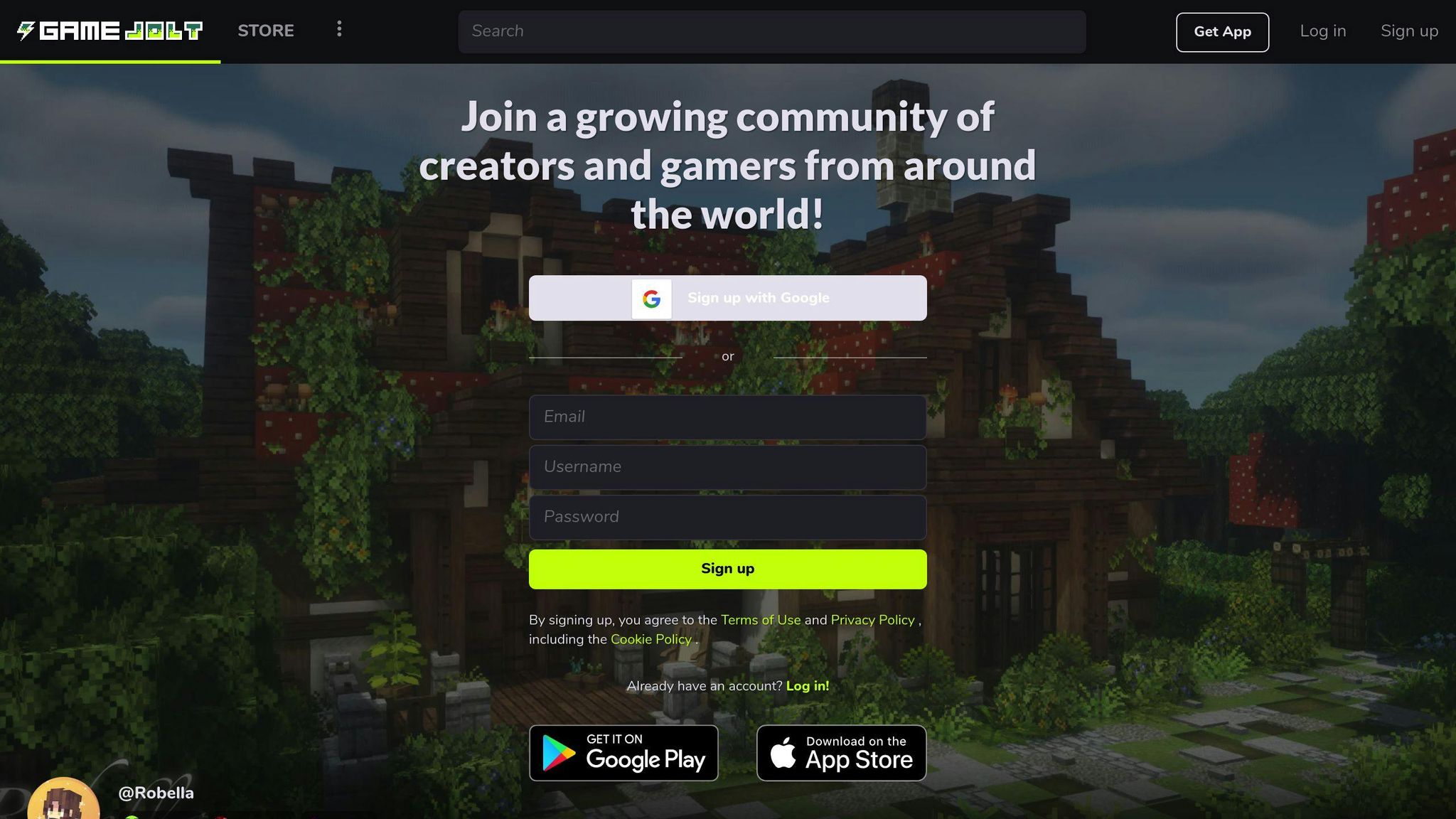
GameJolt is a platform where indie game developers can sell their games. Here's what you need to know:
Revenue Share
GameJolt lets developers choose how much of their earnings to share with the platform:
| Aspect | Details |
|---|---|
| Developer's share | Up to 100% |
| Platform's maximum share | 10% |
| Tax handling | GameJolt manages taxes, including VAT |
| Withdrawals | Anytime, or store in GameJolt wallet |
Users and Reach
GameJolt has many users:
| Metric | Value |
|---|---|
| Page visits per year | Over 330 million |
This gives indie developers a chance to show their games to many people.
Game Development Support
GameJolt offers tools to help developers:
| Tool | Purpose |
|---|---|
| Early Access | Publish games before they're finished |
| Devlog | Share updates about game development |
| Revenue streams | Game sales and ad revenue |
These tools help developers get feedback and improve their games.
Marketing Help
GameJolt helps developers promote their games:
| Feature | Benefit |
|---|---|
| Marketplace | Sell games directly to users |
| Partner program | Connect with YouTube and Twitch players |
These features help developers reach more people and get more attention for their games.
GameJolt is good for indie game developers who want to:
- Keep most of their earnings
- Reach many players
- Get help with marketing their games
7. Own Website
Selling game codes on your own website gives you full control but requires more work. Here's what you need to know:
Money and Pricing
| Aspect | Details |
|---|---|
| Revenue | Keep 100% of sales |
| Pricing | Set your own prices |
| Payment plans | Choose how customers pay |
Reaching Customers
Having your own website means:
- You control how your game looks
- You can target specific customers
- You need to do your own marketing
Finding Your Game
On your own website:
- You control how people see your game
- You can make it easy for search engines to find your site
- You need to work on getting people to visit
Marketing and Support
| Task | Responsibility |
|---|---|
| Marketing | You do it yourself |
| Customer support | You handle it |
| Website analytics | You track and improve |
Selling on your own site takes more time and effort. You'll need to:
- Handle payments
- Market your game
- Support customers
This can take time away from making games. But tools like PayPro Global can help you:
- Sell more easily
- Reduce risks
- Grow your business worldwide
Consider if you have the time and skills to run your own website before choosing this option.
Good and Bad Points
When choosing where to sell your game codes, it's important to look at what's good and bad about each platform. Here's a simple breakdown:
Steam
| Good Points | Bad Points |
|---|---|
| Many users | Takes 30% of your money |
| Easy to put your game up | Hard to stand out |
| Players can talk to each other | Less control over marketing |
Epic Games Store
| Good Points | Bad Points |
|---|---|
| You keep more money (88%) | Fewer users than Steam |
| They pick which games to sell | Not as many ways for players to talk |
| They help indie developers | Hard to stand out |
GOG (Good Old Games)
| Good Points | Bad Points |
|---|---|
| Games work without internet | Fewer users than Steam |
| You keep 70% of your money | Not as many ways for players to talk |
| They help indie developers | Hard to stand out |
Itch.io
| Good Points | Bad Points |
|---|---|
| You choose how much to share | Fewer users than Steam |
| They help indie developers | Less help with marketing |
| Players can talk to each other | Hard to stand out |
Humble Bundle
| Good Points | Bad Points |
|---|---|
| Special way of selling games | Fewer users than Steam |
| They help indie developers | Not as many ways for players to talk |
| Some money goes to charity | Hard to stand out |
GameJolt
| Good Points | Bad Points |
|---|---|
| They help indie developers | Fewer users than Steam |
| Players can talk to each other | Less help with marketing |
| Easy to put your game up | Hard to stand out |
Own Website
| Good Points | Bad Points |
|---|---|
| You keep all the money | More work for you |
| You set the prices | Fewer people see your game |
| You talk directly to players | You have to fix any problems |
Wrap-up
After looking at different places to sell your game codes as an indie game developer, it's important to think about what's good and bad about each option. Here's a quick look at the main choices:
| Platform | Good Points | Bad Points |
|---|---|---|
| Steam | Many users, easy to use | Takes 30% of sales, hard to stand out |
| Epic Games Store | You keep 88% of sales | Fewer users than Steam |
| GOG | No internet needed for games | Fewer users, less player talk |
| Itch.io | You choose how much to share | Fewer users, less marketing help |
| Humble Bundle | Special sales, helps charity | Fewer users, less player talk |
| GameJolt | Helps indie developers | Fewer users than Steam |
| Own Website | Keep all money, set own prices | More work, fewer people see your game |
To pick the best place to sell your game:
- Look at how many people use each platform
- Check how much money you'll keep from sales
- See what kind of help you'll get with marketing
- Think about how much work you want to do yourself
By picking the right place(s) to sell your game, you can:
- Get more people to see your game
- Make more money
- Do better as an indie game developer
FAQs
Should I put my game on itch.io or Steam?
Both itch.io and Steam are good places to sell indie games, but they're different. Here's a quick look at each:
| Platform | Good Points | Not-so-good Points |
|---|---|---|
| Itch.io | - You choose how much to share - Easy to set up - Good for small, niche games |
- Fewer users - Less help with marketing |
| Steam | - Many users - Easy to use - Players can talk to each other |
- Takes 30% of sales - Hard to stand out |
Pick itch.io if you:
- Want more control over your game's page
- Don't mind fewer users
- Have a small or niche game
Pick Steam if you:
- Want to reach more people
- Are okay with giving up 30% of sales
- Want built-in ways for players to talk
Think about what's most important for your game when choosing where to sell it.
Add a New Sales Channel
- • Digital downloads
- • Courses & tutorials
- • Visual & audio assets
- • Game credits or licenses
- • Private memberships

